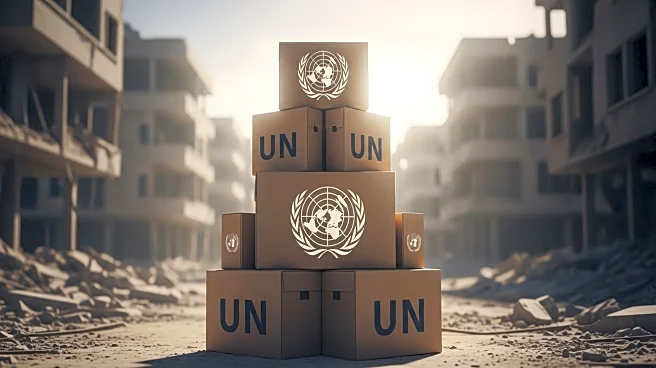What's Happening?
A ceasefire between Israel and Hamas has taken effect in Gaza, allowing thousands of displaced residents to return to their homes. The United Nations has been authorized by Israel to deliver increased humanitarian aid to the region, including 170,000 metric tons of supplies from neighboring countries like Jordan and Egypt. This aid aims to address severe malnutrition and famine conditions exacerbated by previous restrictions on aid access during the conflict. The ceasefire agreement also includes the release of 48 hostages by Hamas, with 20 believed to be alive. An international force, primarily composed of troops from Arab and Muslim countries, is being considered for security in Gaza, although Hamas has rejected any foreign guardianship, insisting that governance is a Palestinian matter.
Why It's Important?
The ceasefire and subsequent aid deliveries are crucial for alleviating the humanitarian crisis in Gaza, where 90% of the population has been displaced due to the conflict. The increased aid is expected to provide essential supplies such as food, medical equipment, and fuel, which are vital for survival and rebuilding efforts. The involvement of an international security force could stabilize the region, although Hamas's rejection of foreign oversight presents challenges. The situation impacts regional stability and international relations, particularly involving Arab and Muslim countries. The humanitarian efforts are critical as winter approaches, raising the stakes for timely aid delivery.
What's Next?
The next steps involve the continued delivery of humanitarian aid and the potential deployment of an international security force in Gaza. The release of hostages by Hamas is expected within days, which could further ease tensions. However, the rejection of foreign guardianship by Hamas may complicate the establishment of a transitional authority for Gaza. The international community, including the United States, will likely monitor the situation closely, with potential diplomatic efforts to address unresolved issues in President Trump's peace plan, such as the disarmament of Hamas.
Beyond the Headlines
The ceasefire and aid efforts highlight the complex geopolitical dynamics in the region, with implications for international diplomacy and humanitarian policies. The rejection of foreign oversight by Hamas underscores the challenges in implementing external governance solutions in conflict zones. The humanitarian crisis in Gaza also raises ethical questions about the responsibility of the international community to intervene and provide aid in war-torn areas.










